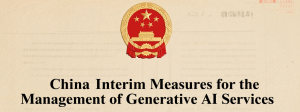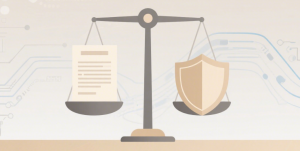
Chapter 1 General Provisions
Article 1: These Measures are formulated in accordance with the Cybersecurity Law of the People’s Republic of China, the Data Security Law of the People’s Republic of China, the Personal Information Protection Law of the People’s Republic of China, the Law of the People’s Republic of China on the Advancement of Science and Technology, and other laws and administrative regulations, in order to promote the healthy development and standardized application of generative artificial intelligence, safeguard national security and the public interest, and protect the lawful rights and interests of citizens, legal persons, and other organizations.
Article 2: These Measures apply to the use of generative artificial intelligence technology to provide services for generating text, pictures, audio, video, and other content to the public in the People’s Republic of China (hereinafter referred to as generative artificial intelligence services).
Where the state has other provisions on the use of generative artificial intelligence services to engage in activities such as press and publication, film and television production, literary and artistic creation, those provisions shall prevail.
The provisions of these Measures shall not apply to industry organizations, enterprises, educational and scientific research institutions, public cultural institutions, relevant professional institutions, etc., where generative AI technology is developed and applied and does not provide generative AI services to the domestic public.
Article 3: The state adheres to the principles of attaching equal importance to development and security, promoting innovation, and combining governance according to law, takes effective measures to encourage the innovation and development of generative artificial intelligence, and implements inclusive, prudent, and classified and hierarchical supervision of generative artificial intelligence services.
Article 4: The provision and use of generative AI services shall comply with laws and administrative regulations, respect social morality and ethics, and comply with the following provisions:
(1) Adhere to the core socialist values, and must not generate content prohibited by laws and administrative regulations, such as inciting subversion of state power, overthrowing the socialist system, endangering national security and interests, damaging the national image, inciting secession, undermining national unity and social stability, promoting terrorism and extremism, promoting ethnic hatred, ethnic discrimination, violence, obscenity, pornography, and false and harmful information;
(2) In the process of algorithm design, training data selection, model generation and optimization, and service provision, take effective measures to prevent discrimination on the basis of ethnicity, belief, country, region, gender, age, occupation, health, etc.;
(3) Respect intellectual property rights and business ethics, keep trade secrets, and do not use algorithms, data, platforms, and other advantages to implement monopoly and unfair competition;
(4) Respect the lawful rights and interests of others, and must not endanger the physical and mental health of others, and must not infringe on the rights and interests of others’ portrait, reputation, honor, privacy, and personal information;
(5) Based on the characteristics of service types, take effective measures to improve the transparency of generative AI services and improve the accuracy and reliability of generated content.
Chapter 2 Technology Development and Governance
Article 5: Encourage the innovative application of generative artificial intelligence technology in various industries and fields, generate positive, healthy, and upward-looking high-quality content, explore and optimize application scenarios, and build an application ecosystem.
Support industry organizations, enterprises, educational and scientific research institutions, public cultural institutions, relevant professional institutions, etc. to collaborate on generative artificial intelligence technology innovation, data resource construction, transformation and application, risk prevention, etc.
Article 6 Encourage independent innovation in basic technologies such as generative AI algorithms, frameworks, chips, and supporting software platforms, carry out international exchanges and cooperation on an equal and mutually beneficial basis, and participate in the formulation of international rules related to generative artificial intelligence.
Promote the construction of generative artificial intelligence infrastructure and public training data resource platforms. Promote the collaborative sharing of computing power resources and improve the efficiency of computing power resource utilization. Promote the classification and grading of public data and open it in an orderly manner, and expand high-quality public training data resources. Encourage the use of secure and trusted chips, software, tools, computing power, and data resources.
Article 7: Generative AI service providers (hereinafter referred to as “providers”) shall carry out training data processing activities such as pre-training and optimization training in accordance with law, and comply with the following provisions:
(1) Use data and basic models with legitimate sources;
(2) Where intellectual property rights are involved, they must not infringe on the intellectual property rights enjoyed by others in accordance with law;
(3) Where personal information is involved, personal consent shall be obtained or other circumstances that comply with laws and administrative regulations;
(4) Take effective measures to improve the quality of training data, and enhance the authenticity, accuracy, objectivity, and diversity of training data;
(5) Other relevant provisions of laws and administrative regulations such as the Cybersecurity Law of the People’s Republic of China, the Data Security Law of the People’s Republic of China, and the Personal Information Protection Law of the People’s Republic of China, as well as the relevant regulatory requirements of relevant competent authorities.
Article 8: Where data labeling is carried out in the process of generative AI technology research and development, the provider shall formulate clear, specific, and actionable labeling rules that meet the requirements of these Measures; carry out data annotation quality assessment, sampling and verification of the accuracy of annotation content; Conduct necessary training for markers, enhance their awareness of respecting the law and abiding by the law, and supervise and guide labeling personnel to carry out labeling work in a standardized manner.
Chapter 3 Service Specifications
Article 9: Providers shall lawfully assume the responsibility of being a producer of online information content and perform their network information security obligations. Where personal information is involved, it shall assume the responsibility of the personal information processor and fulfill its personal information protection obligations in accordance with the law.
Providers shall sign service agreements with generative AI service users (hereinafter referred to as users) who register their services, clarifying the rights and obligations of both parties.
Article 10: Providers shall clarify and disclose the applicable populations, occasions, and uses of their services, guide users to scientifically and rationally understand and use generative AI technology in accordance with law, and take effective measures to prevent minor users from over-relying on or indulging in generative AI services.
Article 11: Providers shall perform their obligations to protect users’ input information and usage records in accordance with law, and shall not collect unnecessary personal information, illegally retain input information and usage records that can identify users, and must not illegally provide users’ input information and usage records to others.
Providers shall promptly accept and handle individuals’ requests for access, copying, correcting, supplementing, or deleting their personal information in accordance with law.
Article 12: Providers shall label the generated content such as pictures and videos in accordance with the “Provisions on the Administration of Deep Synthesis of Internet Information Services”.
Article 13: Providers shall provide safe, stable, and continuous services in the course of their services to ensure normal use by users.
Article 14: Where providers discover illegal content, they shall promptly take measures such as stopping generation, transmission, or elimination, and adopt measures such as model optimization and training to make rectifications, and report to the relevant competent departments.
If a provider discovers that a user is using generative AI services to engage in illegal activities, it shall take measures such as warning, restricting functions, suspending or terminating the provision of services to the user in accordance with law and agreement, keep relevant records, and report to the relevant competent departments.
Article 15: Providers shall establish and improve complaint and reporting mechanisms, set up convenient portals for complaints and reports, publish handling procedures and feedback time limits, promptly accept and handle public complaints and reports, and provide feedback on handling results.
Chapter IV: Supervision and Inspection and Legal Responsibility
Article 16: Departments such as internet information, development and reform, education, science and technology, industry and information technology, public security, radio and television, and press and publication shall strengthen the management of generative artificial intelligence services in accordance with their respective duties and in accordance with law.
The relevant national competent departments shall formulate corresponding classification and hierarchical supervision rules or guidelines based on the characteristics of generative artificial intelligence technology and its service application in relevant industries and fields, and improve scientific supervision methods that are compatible with innovation and development.
Article 17: Where generative AI services with public opinion attributes or social mobilization capabilities are provided, security assessments shall be carried out in accordance with relevant state provisions, and procedures for algorithm filing, change, and cancellation shall be carried out in accordance with the “Provisions on the Administration of Algorithm Recommendations for Internet Information Services.”
Article 18: If users find that generative AI services do not comply with laws, administrative regulations, and these Measures, they have the right to complain or report to the relevant competent departments.
Article 19: Relevant competent departments shall supervise and inspect generative AI services in accordance with their duties, and providers shall cooperate in accordance with law, explain the source, scale, type, labeling rules, algorithm mechanisms, etc. of training data as required, and provide necessary technical and data support and assistance.
Relevant institutions and personnel participating in the security assessment, supervision and inspection of generative AI services shall keep state secrets, commercial secrets, personal privacy, and personal information known in the course of performing their duties confidential in accordance with law, and shall not disclose or illegally provide them to others.
Article 20: Where the provision of generative AI services from outside the People’s Republic of China to domestic does not comply with laws, administrative regulations, and these Measures, the CAC shall notify the relevant institutions to take technical and other necessary measures to deal with it.
Article 21: Where providers violate the provisions of these Measures, the relevant competent departments shall impose punishment in accordance with the provisions of the Cybersecurity Law of the People’s Republic of China, the Data Security Law of the People’s Republic of China, the Personal Information Protection Law of the People’s Republic of China, the Law of the People’s Republic of China on the Advancement of Science and Technology, and other laws and administrative regulations; Where laws and administrative regulations do not provide for this, the relevant competent departments shall give warnings, notify criticisms, and order corrections within a time limit. if corrections are refused or the circumstances are serious, the provision of relevant services shall be ordered to be suspended.
if it constitutes a violation of public security administration, public security administration punishment shall be given in accordance with law; if a crime is constituted, criminal responsibility shall be pursued in accordance with law.
Chapter V Supplementary Provisions
Article 22 The meanings of the following terms in these Measures are:
(1) Generative artificial intelligence technology refers to models and related technologies with text, pictures, audio, video, and other content generation capabilities.
(2) Generative AI service providers refer to organizations and individuals that use generative AI technology to provide generative AI services (including providing generative AI services by providing programmable interfaces).
(3) Generative AI service users refer to organizations and individuals who use generative AI services to generate content.
Article 23: Where laws and administrative regulations provide that relevant administrative permits shall be obtained for the provision of generative AI services, providers shall obtain permits in accordance with law.
Foreign investment in generative AI services shall comply with the provisions of relevant laws and administrative regulations on foreign investment.
Article 24 These Measures shall come into force on August 15, 2023.

